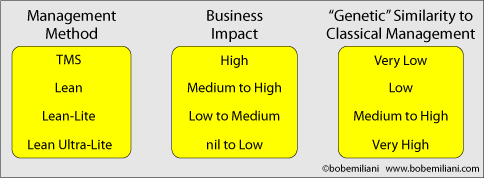Toyota’s management system (TMS), and its derivative Lean management (LM), can be viewed as variations in the population of management systems (the “species”). These variations are deliberate, not random, in their origin. These “offspring” resemble their parent, classical management, at the highest levels of comparison, but differ greatly in their details. Both TMS and LM are subject to “natural selection” that results from the need to preserve certain traits characteristic of classical management.
There is a competition between the predatory (clamorous) and the peaceful (amicable) ways of managing business affairs internally, between organizations (e.g. suppliers), and with society. The former, classical management, and the latter, Lean management, both must struggle to survive, but classical management has certain advantages that has enabled it to survive and prosper for hundreds of years.
The habits associated with classical management are deeply ingrained in business thinking, business practice, on-the-job business training, and business education. More precisely, classical management is ingrained in the economic, social, political, historical, philosophical, legal, and business structures of society. Each new variation in management practice must contend with its heredity; the inherited or easily transmissable features of classical management.
So when Lean management presents itself to leaders as an alternative method for managing an organization, it must contend with a habitual response by leaders to shape it in the mold of classical management. This occurs because classical management is the foundation or base “genetic” institution to which its descendants must, in various ways, conform. In other words, certain traits of classical management, and of the institution of leadership, seek to survive in its offspring no matter how distant the variation may be. Thus, Lean is bent towards classical management, which greatly reduces its variational features and its efficacy.
In business, as in many other human activities, the past is the accredited guide to the future. The institutions of management and leadership as they exist today are products of the past; past processes and adaptations to past conditions. Classical management being a thing of the past, is always behind the times. As a result, it must underserve the needs of the present, while the newer variants, TMS and LM, are better able to serve the needs of the present.
The organizations that are regarded as “north stars” of the Lean movement all contain genetic material from classical management, as evidenced by their hierarchical structures, obedience to authority, and their economic (private property) and political interests (power). This genetic residue is an ever-present threat to Lean’s variational features and its efficacy. Because of this, the risk of rapid backslide into classical management is ever-present.

Over the last 30 years we have seen TPS devolve into forms of management method that have ever-greater genetic similarity to classical management (see above image). These reflect the mental attitudes and aptitudes of leaders who seek to conserve classical management. It is only in rare cases that conditions force a change. When such change occurs, it is a change in person (e.g. CEO), not a change in the larger system that classical management exists — which, if such change were to occur, might extinguish classical management. Absent that, any change will revert back to classical management sooner or later.
For leaders, business is a constantly high-threat environment, whether it is due to unrealistic objectives, poor planing, internal politics, competition in the marketplace, business cycles (expansion, recession, depression), government regulation or oversight, lawsuits, or the unknown. This, understandably, results in an enduring, multi-generation spanning conservatism that, in addition to avoiding change, plays a major role in assuring the stability and durability of classical management and leaders’ habits of thought. Leaders force the continuous diminishment of Lean as a useful variant and reduce it to the point where it has little meaning or utility. Under these conditions, Lean management is not the fittest to survive.
Yet, against all odds, we continue working to advance TMS and LM, as we should do. The day may come when the larger system will change and the variants will emerge from the long shadow of classical management — perhaps sooner than we imagine. Maybe they will even evolve to discard their vestiges of classical management. Stranger things have happened.
